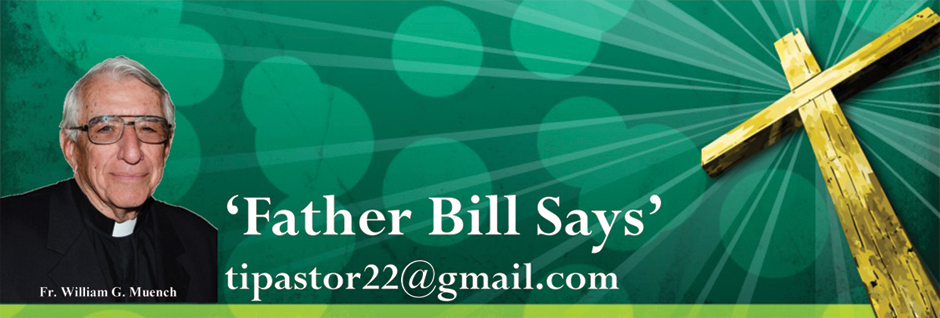October 23, 2024 By Father William Muench Each year, no matter where I was stationed, I enjoyed having a part in the OCIA – formerly RCIA – parish program. So, this year, I am involved in the program here. This week I am asked to speak about the Church’s Magisterium – the pope and the bishops. So, today, I would like to share with you my plan for my presentation. I want to demonstrate to the group the importance of the Magisterium of our Catholic Church. I plan to begin with a Gospel story – Matthew 16, the confession of Peter. “When Jesus went into the region of Caesarea Philippi, he asked the disciples, ‘Who do people say that the Son of Man is?’ They replied, ‘Some say John the Baptist, others Elijah, still others Jeremiah, or one of the prophets.’” Here, I want to discuss how important it is how we answer this question – for ourselves.) The Gospel story continues, “Jesus said to them, ‘But who do you say that I am.’ Simon Peter said, ‘You are the Messiah, the Son of the Living God.’” Here, I will tell the group the importance of Jesus realizing that Peter understands. Jesus continues in the Gospel, “Blessed are you, Simon, Son of Jonah. For flesh and blood has not revealed this to you, but my heavenly Father. And I say to you, you are Peter and upon this rock I will build my Church, and the gates of the netherworld shall not prevail against it. I will give you the keys of the Kingdom of Heaven.” At this point, we’ll discuss Peter as the rock, the foundation. Jesus chooses Peter. He is the one to lead and build the Church. The pope – the first pope – all the bishops of Rome – all the bishops of all time – throughout the centuries are and continue to be the successors of the original apostles. The pope is the visible foundation of the bishops and the whole company of the faithful. Here, I will also speak to the group about the present pope, Pope Francis. A bishop is the chief shepherd of their diocese. The bishop is the chief teacher of the diocese. Each bishop accepts the challenge to defend and guide the diocese. Here, I plan to speak of the bishop of their own diocese. Each bishop is a priest and celebrates the sacrament of the Catholic Church but now is chosen by the Pope to become a bishop. As a bishop, he is designated as the minister of confirmation – calling and anointing men and women to be active in their parish, in the Church. And the bishop has the most important power of ordaining deacons and priests for the ministry of the Church. I also plan to speak of the bishop as the one who builds the Catholic Church in each diocese of the world. So, the Magisterium of the Catholic Church – the Pope, in communion with the bishops, guides the faithful in proclaiming the message of Jesus. The Church through the Magisterium is the fulfillment of the teaching office of the Church. When the Magisterium proclaims a doctrine that has been divinely revealed, it must be accepted with the obedience of faith by the whole People of God. I will also discuss here the bishops always leading with the participation of his priests and the laity. I received an image of the Church’s Magisterium in the celebration of the Second Vatican Council as a young priest, and I plan to describe the Council a bit to them. All the bishops of the world gathered with Pope John XXlll to discuss the life of the Church in their place in the world. This Council of the Church’s Fathers developed ten foundational documents that continue to direct our Catholic Church today. I know personally the powerful effect of the Council; my priesthood was completely transformed. I love the Second Vatican Council. One more thing today: On a recent Sunday, the Gospel reading tells us that Jesus spoke to his apostles that all authority is about service. “Rather whoever wishes to be great among you will be your servant; whoever wishes to be first among you will be the slave for all.” |
||||


